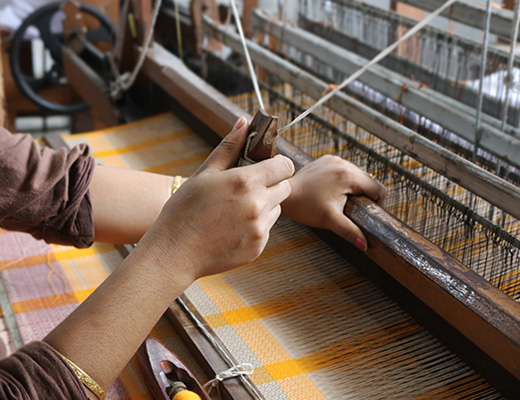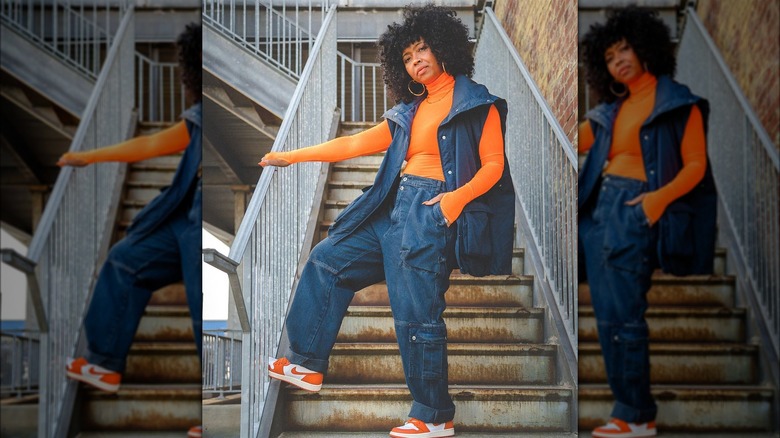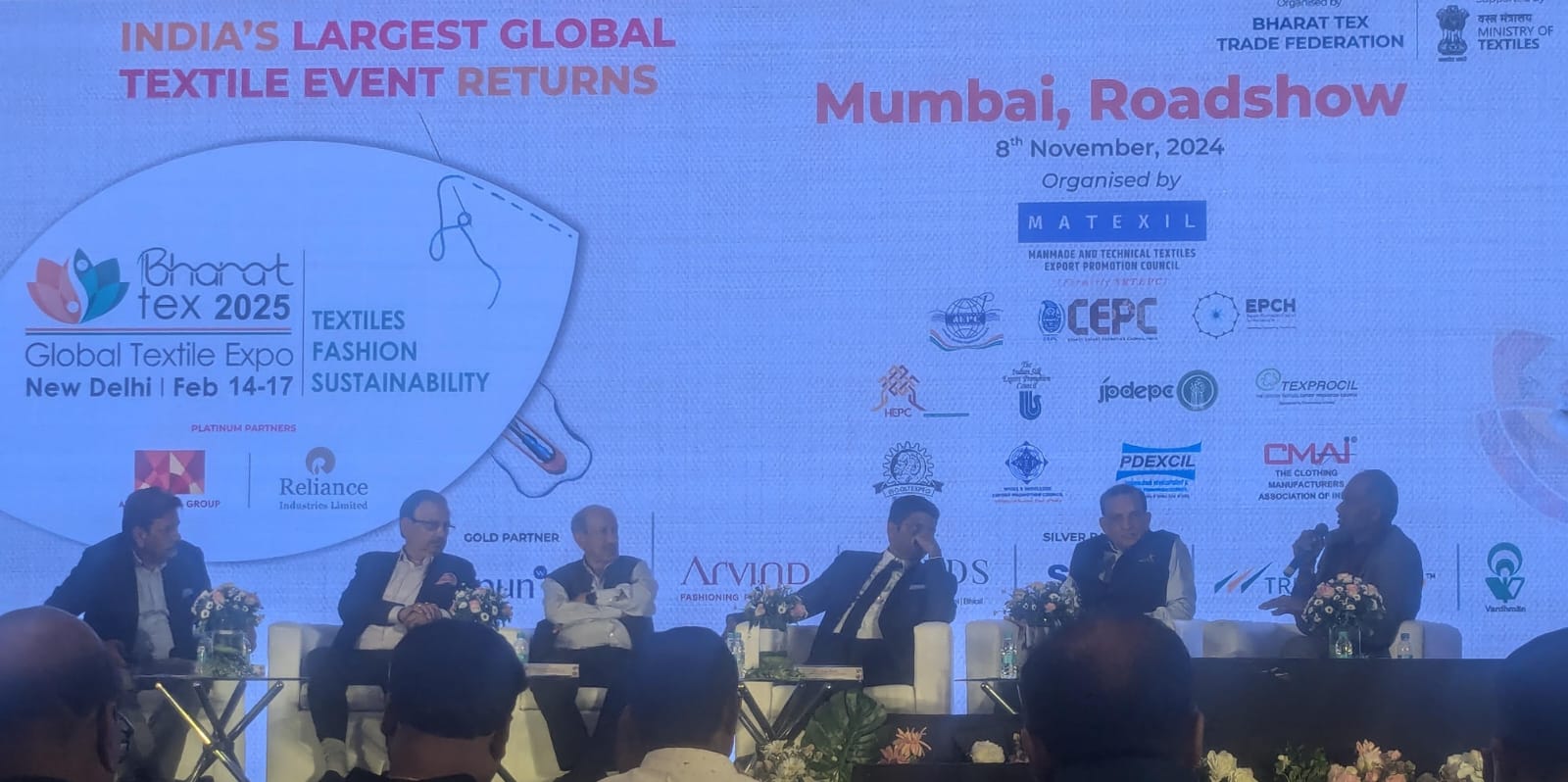FW
At the Textile Exchange Conference 2024 in Pasadena, Eastman highlighted its commitment to sustainability by showcasing Naia Renew ES, a cellulosic fiber made with 60 per cent Global Recycle Standard (GRS)-certified recycled content. Composed of 40 per cent certified recycled waste, 20 per cent recycled cellulose, and 40 per cent sustainably sourced wood pulp, Naia Renew ES is gaining traction with eco-conscious brands like Reformation, as it supports high sustainability standards without compromising style or quality.
Eastman’s innovative carbon renewal technology underpins Naia Renew fibers, breaking down waste to molecular building blocks to create traceable, biodegradable fibers that reduce reliance on virgin materials. This process is helping Eastman set new industry standards in circularity, offering brands a ‘Runway-Ready’ solution that meets environmental goals with fashion-forward looks.
Eastman’s ‘Recycled and Runway Ready’ showcase at Booth 18 highlights collections made from recycled content, creatively displayed through AI-enhanced photography. This exhibit emphasizes Eastman's aim to bring sustainable beauty to mainstream fashion and inspire consumer choices.
In collaboration with partners like Debrand and Patagonia, Eastman is pioneering textile-to-textile recycling, demonstrating how pre- and post-consumer waste can be transformed into new garments. Furthermore, Eastman fosters sustainability in fashion education, engaging institutions like Barcelona’s Escola Superior de Disseny and the Beijing Institute of Fashion Technology to prepare the next generation of eco-focused designers.
Eastman’s Carolina Sister Cohn will join leaders from Circ, Circulose, and Syre for a panel on October 31st, addressing how textile innovation can drive widespread adoption of sustainable solutions.
Pacific Jeans Ltd, a leading denim manufacturer, will showcase its latest sustainable collections at the Denim Lounge during the 17th Bangladesh Denim Expo, scheduled for November 4-7 at ICCB’s Hall-4 in Dhaka. Known for its world-class denim since 1984, Pacific Jeans has become a key supplier for major fashion brands worldwide, exporting to over 50 countries.
Committed to innovation and sustainability, the company aligns its practices with the UN Sustainable Development Goals, underscoring a responsible approach in the global apparel supply chain. Its LEED certification further reflects this dedication, establishing Pacific Jeans as a frontrunner in ethical manufacturing.
At the Denim Lounge, Pacific Jeans will showcase a collection that blends innovative design, functionality, and sustainability, highlighting Bangladesh's advancing role in denim innovation. Syed M Tanvir, Managing Director of Pacific Jeans Ltd, noted that participating in the Bangladesh Denim Expo offers a platform to display the strengths of Bangladesh’s denim industry to an international audience, with an aim to establish the country as a leading force in the global denim supply chain.
Pacific Jeans has previously showcased its design and technological achievements at Bangladesh Denim Innovation Nights and represented Bangladesh at the Best of Bangladesh event in the Netherlands in 2022. The Bangladesh Denim Expo, organized by the country’s apparel industry, is held biannually and focuses on advancements in sustainable fabric technology, furthering the nation's position as a leader in responsible fashion.
Carbios, a pioneer in bio recycling technologies, has collaborated with global brands On, Patagonia, PUMA, Salomon, and PVH Corp., the parent company of Calvin Klein, to create the world’s first polyester garment entirely made from enzymatically recycled textile waste. Unlike conventional recycled polyesterlargely derived from PET bottles—this T-shirt represents a breakthrough in ‘fiber-to-fiber’ recycling, converting discarded textiles back into high-quality polyester through Carbios bio recycling technology.
The collaboration aims to establish a closed-loop production system, where polyester fibers from discarded fabrics can be fully recycled into new garments. The demonstration piece, a white T-shirt, was chosen intentionally to emphasize the recycled material's purity, made from complex textile waste mixes that include various dyes, cotton, and elastane, which are challenging to recycle through traditional methods. Carbios technology deconstructs polyester using enzymes into fundamental components (PTA and MEG) which are then repolymerized and spun into yarn.
This innovation in Carbios Clermont-Ferrand pilot facility showcases how textile waste can replace petroleum-based raw materials to produce virgin-quality polyester, significantly lowering the environmental impact by reducing landfill reliance and carbon emissions.
Production began with consortium brands contributing textile scraps, which Carbios processed and converted into monomers, showcasing the technology’s seamless integration with standard textile manufacturing. This garment reflects a critical step toward sustainable practices in the apparel industry, especially as only 1 per cent of current fiber waste is recycled back into fibers.
Carbios commitment to scaling biorecycling includes a new industrial facility under construction in Longlaville, France, and agreements with PET producers in Asia and Europe. Consortium members, including PUMA and Salomon, emphasized the importance of advancing circular solutions for polyester, targeting a more sustainable industry.
As stated by Carbios CEO Emmanuel Ladent, the technological advancement reflects the collective efforts to surmount recycling challenges and push the textile industry toward a circular future, one biorecycled garment at a time.
Stockholm-based and Unilever-owned company, Blueair has teamed up with New Zealand’s Lanaco to revolutinise indoor air quality by developing advanced air filters using electrostatic wool and plant fibers.
Aligning with Blueair’s growth strategy, this collaboration follows the recent launch of its ‘Air Designed for a Better Life’ campaign highlighting the health benefits of clean indoor air for sleep, mood, and overall well-being.
Lanaco’s EcoStatic filter technology leverages the natural properties of wool combined with innovative, data-driven technology to create highly efficient filters with minimal airflow resistance. Crafted entirely from wool, the EcoStatic media uses positively and negatively charged fibers to capture particles while maintaining optimal airflow due to its porous structure. Wool’s natural fire-resistance and water-repellent qualities also prevent clogging from moisture, setting it apart from conventional synthetic filters.
Marking the first use of natural wool fiber in air filtration, Andy Lu, CEO, Blueair terms this partnership with Lanaco as a pioneering move for the industry. The wool filter technology sets a new performance standard,he states noting the rigorous testing process behind the filter, including trials in space exploration. Nick Davenport, CEO, Lanaco, adds, the company’s partnership with Blueair underscores its shared commitment to enhance air quality and make a meaningful impact on indoor environments.
With Jean-Christophe Babin, CEO describing it as a ‘market with unparalleled potential,’ India has become the primary focus for expansion for Italian luxury brand Bvlgari. To tap into India’s rapidly growing luxury segment, Bvlgari launched its first digital boutique through a partnership with Tata CLiQ Luxury.
Babin acknowledges, while China led luxury market growth over the past decade, its growth has begun to slow due to market maturity and an oversupply across sectors, including real estate. This normalisation is pushing Bvlgari to pursue double-digit growth globally, positioning India as its ‘growth booster.’ The market’s unique attributes, from robust GDP growth and rising incomes to high education levels, set it apart globally.
India’s vast diversity in wealth distribution, makes luxury e-commerce a particularly promising avenue, notes Babin. Bvlgari's new digital boutique on Tata CLiQ Luxury will feature India-inspired pieces, such as the B.zero1 Kada bracelet and the Bvlgari Mangalsutra, as well as popular global collections like Serpenti Viper bracelets, B.zero1 rings, and the OctoFinissimo and Octo Roma watches, alongside leather goods and accessories.
Gopal Asthana, CEO, Tata CLiQ, terms the company’s collaboration with Bvlgarias a monumental step in expanding the platform's luxury portfolio. Currently Tata CLiQ generates 55 per cent of its revenue from non-metro markets, underscoring the significant demand for luxury beyond India’s major cities. The company partnership with Bvlgari gives it a wider access to a brand known for Italian craftsmanship and heritage, adds Asthana. To ensure a seamless shopping experience to customers, Tata CLiQ Luxury will also provide a concierge experience with staff trained by Bvlgari.

India, a major player in the global textile industry is no longer just a manufacturing hub, it is fast emerging as a leader in textile innovation, driven by a dynamic startup ecosystem, government initiatives, and a growing awareness of sustainability.
This shift is critical, as highlighted by the United Nations Industrial Development Organisation (UNIDO) in its ‘Innovative Technologies for the Textile and Apparel Sector in India’ (ITASSI) report. The report underscores that innovation is crucial for India to maintain its competitive edge. Driving this wave of change is a dynamic startup ecosystem, fostered by initiatives like Startup India. India now boasts of over 140,000 registered startups, and ranked 40th in the 2023 Global Innovation Index. This signifies a cultural shift towards entrepreneurship.
From waterless dyeing to algae-based leather
A wave of cutting-edge technologies is sweeping across the Indian textile landscape. Startups and established companies are focusing on sustainable practices with innovations viz.
Waterless dyeing: Companies like Alchemie Technologies are pioneering waterless dyeing solutions that drastically reduce water consumption and pollution. This technology uses a supercritical carbon dioxide process to dye fabrics, eliminating the need for water and harmful chemicals.
Microbial dyes: Naturezyme, a Pune-based startup, is producing dyes from microbes, offering a sustainable alternative to traditional synthetic dyes. These dyes are biodegradable and require less water and energy to produce.
Upcycling: Numerous entrepreneurs are leading the way in product innovation through upcycling, transforming textile waste into valuable products like fashion accessories and home décor.
Innovations beyond sustainability
Beyond sustainability, Indian innovators are exploring new materials and processes as well. Technology is revolutionizing various aspects of the textile industry. For example, the National Technical Textiles Mission (NTTM) is supporting the development of smart textiles using nanomaterials. These fabrics have applications in healthcare, sports, and defense, offering benefits like temperature regulation, moisture management, and even health monitoring. Traceability in cotton is also high on the agenda. Kasturi Cotton, a public-private partnership, is leveraging blockchain technology to enhance traceability in the cotton supply chain. This ensures transparency and accountability, allowing consumers to verify the origin and quality of their cotton products. Algae-based leather is another innovation that is making a mark. This sustainable alternative to traditional leather is gaining traction, with startups like Phool.co creating bio-leather from temple flower waste. Startups are also developing digital solutions for inventory management, supply chain optimization, and workforce management, improving efficiency and productivity across the industry.
The ITASSI report emphasizes the growing acceptance of digital technologies within the Indian textile sector. Startups are leveraging digital tools to optimize various aspects of the industry.
Equipment monitoring: IoT sensors and data analytics are improving efficiency and reducing downtime in manufacturing processes.
Supply chain visibility: Blockchain and track-and-trace systems are enhancing transparency and accountability across the supply chain.
Workforce management: Digital platforms are streamlining workforce management, improving productivity, and ensuring fair labor practices.
Weaving a supportive ecosystem
The government too is playing a crucial role in fostering this culture of innovation through initiatives like Startup India for example, this flagship program provides incentives, funding, and mentorship to startups, including those in the textile sector. Similarly, the National Technical Textiles Mission (NTTM) with a budget of Rs 1,480 crore, aims to position India as a global leader in technical textiles. Bharat Tex, the international textile machinery and technology exhibition provides a platform for startups to showcase their innovations. The 2024 edition saw over 80 startups participate in the Textiles Startup Grand Challenge.
While these advancements are promising, continuous innovation remains crucial for India's textile industry to thrive. Focus areas include:
Sustainability: Developing and adopting eco-friendly technologies to minimize environmental impact.
Skill development: Training the workforce to adapt to new technologies and processes.
Global Collaboration: Partnering with international players to access knowledge and markets.
By embracing innovation, India's textile industry is not only securing its future but also contributing to a more sustainable and responsible global textile landscape.
Marking the second consecutive year of growth after a previous two-year decline, Brazil’s imports of women's hosiery items, including socks and stockingsincreased by 25 per cent to 14 million pairs in 2023.
In terms of value, women's hosiery imports by Brazil rose to $89 million in 2023, as per IndexBox estimates. China emerged as Brazil’s top supplier in 2023, providing 9.3 million pairs, or 68 per cent of Brazil's total hosiery imports. This volume far surpassed the second-largest supplier, Paraguay, which supplied 3.9 million pairs. Argentina ranked third, with a supply of 105,000 pairs, representing a 0.8 per cent share. From 2013 to 2023, China’s exports to Brazil grew at an average annual rate of 17.8 per cent, while Paraguay experienced a higher growth rate of 39.1 per cent per year. Meanwhile, Argentina's volume remained stable.
In terms of value, Brazil’s main suppliers in 2023 included China with imports worth $43 million from the country. This was followed by Paraguay with $35 million imports, and Argentina with imports valuing $4.1 million. Together, these countries accounted for 92 per cent of Brazil’s total imports. Imports from Paraguay grew at a 47.8 per cent CAGR over the review period, while imports from other suppliers grew at more moderate growth rates.
In 2023, the average import price of women’s hosiery in Brazil declined by 5.2 per cent to $6.60 per pair (CIF) from the previous year. Import prices have generally trended downward since 2015 when they peaked at $14 per pair. Prices also varied significantly by country of origin, with Pakistan having the highest average price at $26 per pair, while Hong Kong had one of the lowest, at $3.10 per pair. From 2013 to 2023, Pakistan's prices rose by an average of 9.1 per cent annually, while prices from other major suppliers displayed mixed trends.
At MarediModa 2024, Cannes, Iluna Group is set to showcase a beachwear line that merges design, innovation, and environmental responsibility. Recognized for pioneering sustainable solutions in lace production, Iluna’s new collection targets eco-conscious fashion through two distinct offerings.
The first is a fully certified beach capsule collection, crafted with 100 per cent recycled Qnova and Roica EF materials. This line features bikinis and cover-ups produced on Mayer machines, exemplifying Iluna’s circular fashion commitment.
The second collection includes vibrant, sustainable materials like iridescent lace, GRS-certified laminates, and innovative Lurex cords. Patterns blend floral, geometric, and marine elements, accented by versatile macrame, sangallo laces, and fringed pareos.
Iluna also introduces an exclusive, water-saving lace technology using certified polyamide, fully eliminating water in the production process. Since achieving GRS certification for its Green Label range in 2018, Iluna has tracked sustainability progress via the Higgs Index, with sustainable production reaching over 50 per cent in 2022.
Since 2016, Iluna has produced 7.5 million meters of eco-friendly lace, saving 1.5 million liters of water. This year’s innovations include customizable GRS-certified Lurex nets, organic cotton, FSC-certified viscose, and Roica EF elastomer. As a leader in sustainable textiles, Iluna Group demonstrates its ongoing dedication to responsible fashion that combines style, innovation, and environmental stewardship.
Benninger has launched its JigMaster, a cutting-edge jigger designed for discontinuous fabric dyeing, ideal for delicate materials. This innovative system, developed in Switzerland and produced at Benninger's facility in Pune, India, aims to enhance textile dyeing processes while minimizing environmental impact.
Swisstulle, a leader in European bobbinet tulle and technical knitted fabrics, has adopted the JigMaster to optimize its dyeing and finishing operations. With over a century of experience, Swisstulle focuses on sustainability and high quality, supplying textiles to various sectors, including fashion and automotive.
Achim Brugger, CEO of Swisstulle, emphasized the JigMaster's significance in enhancing efficiency and sustainability for the company. The machine incorporates TwinJig technology, which utilizes two independent troughs, enabling water savings of up to 35 per cent during rinsing. Additionally, its counterflow rinsing system further minimizes water and steam consumption, effectively addressing the textile industry's increasing focus on sustainability.
The machine also ensures precise control over speed and tension, critical for Swisstulle's fine fabrics, while fast heating gradients enhance production efficiency. With its plug-and-play capability, the JigMaster integrates seamlessly into existing workflows, minimizing downtime.
The collaboration between Swisstulle and Benninger underscores a shared dedication to innovation and ecological responsibility. By incorporating the JigMaster, Swisstulle strengthens its position as a forward-thinking manufacturer, committed to producing high-performance fabrics sustainably.
Adidas reported a robust third quarter, exceeding expectations with a 14 per cent underlying growth for the brand. The company achieved a gross margin of 51.3 per cent and an operating profit of €598 million, reflecting strong performance across all regions, channels, and product divisions.
Currency-neutral revenues increased by 10 per cent to €6.438 billion, driven largely by footwear sales, which rose 14 per cent. The successful sale of remaining Yeezy inventory contributed approximately €200 million. The company’s strategy to enhance its football lifestyle business and introduce new collections resulted in double-digit growth across both Lifestyle and Performance categories.
Regional growth was notable, with Europe seeing an 18 per cent increase in currency-neutral sales, while Emerging Markets and Latin America grew 16 per cent and 28 per cent, respectively. Although North America experienced a 7 per cent decline due to the Yeezy business, revenues excluding Yeezy increased.
The gross margin improved significantly by 2.0 percentage points, attributed to lower product costs and a favorable product mix. Operating expenses rose by 10 per cent as Adidas invested in marketing and brand initiatives, including major events like UEFA EURO 2024 and the Olympic Games.
For the first nine months of 2024, currency-neutral revenues increased 10 per cent to €17.718 billion. The gross margin also improved, reaching 51.1 per cent. The company effectively managed its inventories, which decreased 7 per cent, allowing for continued growth.
Adidas anticipates a 10 per cent increase in currency-neutral revenues for the full year. The brand's strong momentum and continued investment in innovative products position it well for future growth, reflecting a strategic focus on engaging with a new generation of consumers.
In summary, Adidas's third-quarter results and strategic initiatives highlight a promising trajectory as the brand aims to strengthen its market position and drive sustainable growth moving forward.












